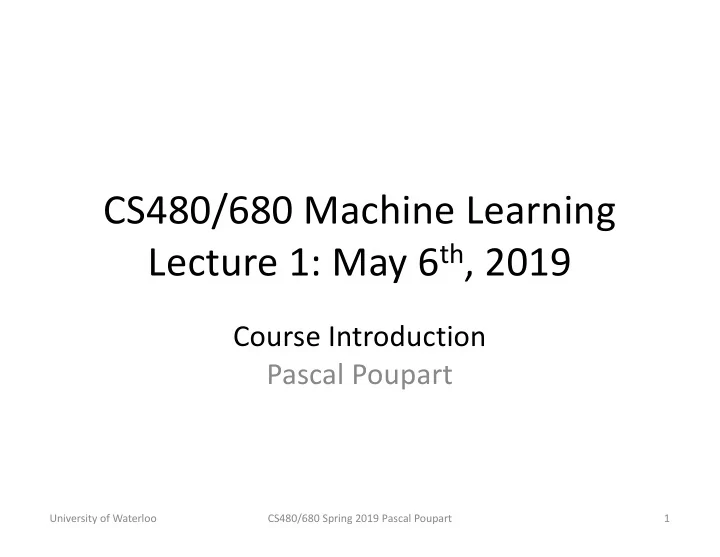

CS480/680 Machine Learning Lecture 1: May 6 th , 2019 Course Introduction Pascal Poupart University of Waterloo CS480/680 Spring 2019 Pascal Poupart 1
Outline • Introduction to Machine Learning • Course website and logistics University of Waterloo CS480/680 Spring 2019 Pascal Poupart 2
Instructor Pascal Poupart Professor 15+ years experience in Machine Learning Principal Researcher University of Waterloo CS480/680 Spring 2019 Pascal Poupart 3
RBC Borealis AI • Research institute funded by RBC • 5 research centers: – Montreal, Toronto, Waterloo, Edmonton and Vancouver • 80 researchers: – Integrated (applied & fundamental) research model • ML, RL, NLP, computer vision, private AI, fintech • We are hiring! University of Waterloo CS480/680 Spring 2019 Pascal Poupart 4
Machine Learning • Traditional computer science – Program computer for every task • New paradigm – Provide examples to machine – Machine learns to accomplish a task based on the examples University of Waterloo CS480/680 Spring 2019 Pascal Poupart 5
Definitions • Arthur Samuel (1959): Machine learning is the field of study that gives computers the ability to learn without being explicitly programmed. • Tom Mitchell (1998): A computer program is said to learn from experience E with respect to some class of tasks T and performance measure P, if its performance at tasks in T, as measured by P, improves with experience E. University of Waterloo CS480/680 Spring 2019 Pascal Poupart 6
Three Categories Supervised learning Reinforcement learning Unsupervised learning University of Waterloo CS480/680 Spring 2019 Pascal Poupart 7
Supervised Learning • Example: digit recognition (postal code) • Simplest approach: memorization University of Waterloo CS480/680 Spring 2019 Pascal Poupart 8
Supervised Learning • Nearest neighbour: University of Waterloo CS480/680 Spring 2019 Pascal Poupart 9
More Formally • Inductive learning (for supervised learning): – Given a training set of examples of the form (", $(")) • " is the input, $(") is the output – Return a function ℎ that approximates $ • ℎ is called the hypothesis University of Waterloo CS480/680 Spring 2019 Pascal Poupart 10
Prediction • Find function ℎ that fits " at instances # University of Waterloo CS480/680 Spring 2019 Pascal Poupart 11
Prediction • Find function ℎ that fits " at instances # University of Waterloo CS480/680 Spring 2019 Pascal Poupart 12
Prediction • Find function ℎ that fits " at instances # University of Waterloo CS480/680 Spring 2019 Pascal Poupart 13
Prediction • Find function ℎ that fits " at instances # University of Waterloo CS480/680 Spring 2019 Pascal Poupart 14
Prediction • Find function ℎ that fits " at instances # University of Waterloo CS480/680 Spring 2019 Pascal Poupart 15
Generalization • Key: a good hypothesis will generalize well (i.e. predict unseen examples correctly) • Ockham’s razor: prefer the simplest hypothesis consistent with data University of Waterloo CS480/680 Spring 2019 Pascal Poupart 16
ImageNet Classification • 1000 classes • 1 million images • Deep neural networks (supervised learning) University of Waterloo CS480/680 Spring 2019 Pascal Poupart 17
Unsupervised Learning • Output is not given as part of training set • Find model that explains the data – E.g. clustering, compressed representation, features, generative model University of Waterloo CS480/680 Spring 2019 Pascal Poupart 18
Unsupervised Feature Generation • Encoder trained on large number of images University of Waterloo CS480/680 Spring 2019 Pascal Poupart 19
Reinforcement Learning Agent State Action Reward Environment Goal: Learn to choose actions that maximize rewards University of Waterloo CS480/680 Spring 2019 Pascal Poupart 20
Animal Psychology • Reinforcements used to train animals • Negative reinforcements: – Pain and hunger • Positive reinforcements: – Pleasure and food • Let’s do the same with computers! – Rewards: numerical signal indicating how good actions are • E.g., game win/loss, money, time, etc. University of Waterloo CS480/680 Spring 2019 Pascal Poupart 21
Game Playing • Example: Go (one of the oldest and hardest board games) • Agent: player • Environment: opponent • State: board configuration • Action: next stone location • Reward: +1 win / -1 loose • 2016: AlphaGo defeats top player Lee Sedol (4-1) – Game 2 move 37: AlphaGo plays unexpected move (odds 1/10,000) University of Waterloo CS480/680 Spring 2019 Pascal Poupart 22
Applications of Machine Learning • Speech recognition – Siri, Cortana • Natural Language Processing – Machine translation, question answering, dialog systems • Computer vision – Image and video analysis • Robotic Control – Autonomous vehicles • Intelligent assistants – Activity recognition, recommender systems • Computational finance – Stock trading, portfolio optimization University of Waterloo CS480/680 Spring 2019 Pascal Poupart 23
This course • Supervised and unsupervised machine learning • But not reinforcement learning • See CS885 Spring 2018 – Website: https://cs.uwaterloo.ca/~ppoupart/teaching/cs885-spring18/ – Video lectures: https://www.youtube.com/playlist?list=PLdAoL1zKcqTXFJniO3Tqqn6xMBBL07EDc University of Waterloo CS480/680 Spring 2019 Pascal Poupart 24
Recommend
More recommend